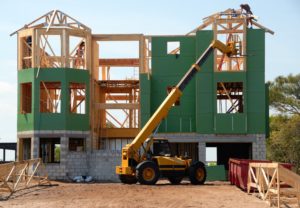How will the Ukraine war affect the housing market?
Arm yourself (no pun intended) for changes you can expect in our home market.
- 4 min read
- March 8, 2022
Arm yourself (no pun intended) for changes you can expect in our home market.
 Just when we thought life was getting back to normal following the pandemic, Russia decides to invade the Ukraine – the largest European military operation since World War II. While this doesn’t seem like it could impact those of us over here in the United States, it most definitely can and probably will. Since the start of the conflict, the stock market has been volatile. This, together with sanctions imposed by the United States and Europe, will likely impact financial markets worldwide.
Just when we thought life was getting back to normal following the pandemic, Russia decides to invade the Ukraine – the largest European military operation since World War II. While this doesn’t seem like it could impact those of us over here in the United States, it most definitely can and probably will. Since the start of the conflict, the stock market has been volatile. This, together with sanctions imposed by the United States and Europe, will likely impact financial markets worldwide.
So how might this affect the housing market, which is already suffering from historically low inventory, high demand, and exorbitant prices?
 In the short term, this can lessen demand for housing and reduce competition among buyers. Sizable global disruptions in the past, such as Brexit, have resulted in investors switching from equities to safer options such as bonds. This increases bond prices, but on the plus side, causes mortgage rates to fall, as has happened recently. For instance, for the week ending March 3rd, the average 30-year fixed-rate mortgage decreased from 3.89% to a 3.76% annual percentage rate (APR). However, this downward trend may not last as the Russia-Ukraine conflict will more than likely trigger an increase in inflation.
In the short term, this can lessen demand for housing and reduce competition among buyers. Sizable global disruptions in the past, such as Brexit, have resulted in investors switching from equities to safer options such as bonds. This increases bond prices, but on the plus side, causes mortgage rates to fall, as has happened recently. For instance, for the week ending March 3rd, the average 30-year fixed-rate mortgage decreased from 3.89% to a 3.76% annual percentage rate (APR). However, this downward trend may not last as the Russia-Ukraine conflict will more than likely trigger an increase in inflation.
 Given that Russia is one of the world’s major gas and oil suppliers, oil prices have skyrocketed since the conflict began. Sanctions and Western economies disengaging from Russia will likely cause another surge in oil prices. Increases in oil prices don’t only affect gas and heating costs. They trickle down to commodities, because the production of food, products, and building supplies often require oil. Those commodities then need to be transported nationally or globally to store shelves. Cost increases and disruptions of trade routes and supply chains due to sanctions will undoubtedly cause a rise in inflation. Inflation in the United States is already at a forty year high at 7.5%. If the cost of energy and food is elevated by diminishing supplies caused by the Russian-Ukraine conflict, Western economies could see it rise to nearly 10%.
Given that Russia is one of the world’s major gas and oil suppliers, oil prices have skyrocketed since the conflict began. Sanctions and Western economies disengaging from Russia will likely cause another surge in oil prices. Increases in oil prices don’t only affect gas and heating costs. They trickle down to commodities, because the production of food, products, and building supplies often require oil. Those commodities then need to be transported nationally or globally to store shelves. Cost increases and disruptions of trade routes and supply chains due to sanctions will undoubtedly cause a rise in inflation. Inflation in the United States is already at a forty year high at 7.5%. If the cost of energy and food is elevated by diminishing supplies caused by the Russian-Ukraine conflict, Western economies could see it rise to nearly 10%.
 The disruption in the global supply chain and rise in inflation could produce an increase in construction costs affecting buyers and builders alike. Home builders can’t build to meet demand because they can’t get the materials needed to complete homes. Also, prices for construction materials have already spiked 22% because of inflation, including a 40% jump in lumber. Higher costs for materials mean higher home prices. This price surge can make it harder for potential homebuyers to gather enough cash for a down payment.
The disruption in the global supply chain and rise in inflation could produce an increase in construction costs affecting buyers and builders alike. Home builders can’t build to meet demand because they can’t get the materials needed to complete homes. Also, prices for construction materials have already spiked 22% because of inflation, including a 40% jump in lumber. Higher costs for materials mean higher home prices. This price surge can make it harder for potential homebuyers to gather enough cash for a down payment.
 The continued uncertainty of the stock market could affect the luxury housing market, where wealthier buyers often cash out stocks or cryptocurrency to purchase expensive housing or vacation homes. The US Federal Reserve will almost certainly increase interest rates to counter the impact of higher inflation. Borrowing becoming more expensive – as well as the volatile stock market – could make buyers at all price points more hesitant to make large purchases…at least temporarily.
The continued uncertainty of the stock market could affect the luxury housing market, where wealthier buyers often cash out stocks or cryptocurrency to purchase expensive housing or vacation homes. The US Federal Reserve will almost certainly increase interest rates to counter the impact of higher inflation. Borrowing becoming more expensive – as well as the volatile stock market – could make buyers at all price points more hesitant to make large purchases…at least temporarily.
 While this rise in interest rates make a home purchase in the near future sound unfeasible, experts say there is no need for panic. Rates started at a low foundation before the conflict began and historically, rates are still low. Right now, any rise in monthly payments based on today’s rates will be nominal. Experts don’t expect rates to hike to more than 3.9% on average. The spike shouldn’t have a great impact on monthly payments unless it reaches more than 4.5%, as witnessed in 2018 when it reached nearly 5% and we saw a drop in sales and price growth.
While this rise in interest rates make a home purchase in the near future sound unfeasible, experts say there is no need for panic. Rates started at a low foundation before the conflict began and historically, rates are still low. Right now, any rise in monthly payments based on today’s rates will be nominal. Experts don’t expect rates to hike to more than 3.9% on average. The spike shouldn’t have a great impact on monthly payments unless it reaches more than 4.5%, as witnessed in 2018 when it reached nearly 5% and we saw a drop in sales and price growth.
 So, in conclusion, the Russian invasion of Ukraine may offer some short-term advantages in the housing market for buyers through lower mortgage rates and decreased buying competition. In the long run, future increases in inflation, mortgage rates, and building materials, will lead to higher home prices. Mostly this will affect more expensive homes. The spike is unlikely to significantly impact monthly payments; therefore, the housing demand should remain tight, and the market will continue to favor sellers.
So, in conclusion, the Russian invasion of Ukraine may offer some short-term advantages in the housing market for buyers through lower mortgage rates and decreased buying competition. In the long run, future increases in inflation, mortgage rates, and building materials, will lead to higher home prices. Mostly this will affect more expensive homes. The spike is unlikely to significantly impact monthly payments; therefore, the housing demand should remain tight, and the market will continue to favor sellers.